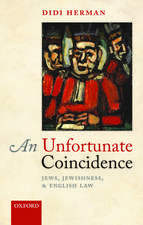Jewish Daily Life in Germany, 1618-1945
Editat de Marion A. Kaplanen Limba Engleză Hardback – 24 mar 2005
Preț: 506.49 lei
Preț vechi: 684.86 lei
-26% Nou
Puncte Express: 760
Preț estimativ în valută:
96.92€ • 100.14$ • 80.63£
96.92€ • 100.14$ • 80.63£
Carte tipărită la comandă
Livrare economică 08-14 martie
Livrare express 12-18 februarie pentru 305.30 lei
Preluare comenzi: 021 569.72.76
Specificații
ISBN-13: 9780195171648
ISBN-10: 0195171640
Pagini: 244
Ilustrații: numerous halftones, 3 tables
Dimensiuni: 166 x 238 x 40 mm
Greutate: 0.93 kg
Editura: Oxford University Press
Colecția OUP USA
Locul publicării:New York, United States
ISBN-10: 0195171640
Pagini: 244
Ilustrații: numerous halftones, 3 tables
Dimensiuni: 166 x 238 x 40 mm
Greutate: 0.93 kg
Editura: Oxford University Press
Colecția OUP USA
Locul publicării:New York, United States
Recenzii
This volume and its focus on daily lives succeeds admirably in making visible the complexities and varied practices of individuals that are too often muffled by sociopolitical and intellectual histories and their focus on structural processes.
Notă biografică
Marion A. Kaplan is Skirball Professor of Modern Jewish History at New York University. Robert Liberles is Professor of Modern Jewish History at Ben Gurion University in Beersheva, Israel. Steven Lowenstein is the Isadore Levine Professor of Jewish History at the University of Judaism. Trude Maurer is Professor of East European and Modern History, University of Goettingen.











